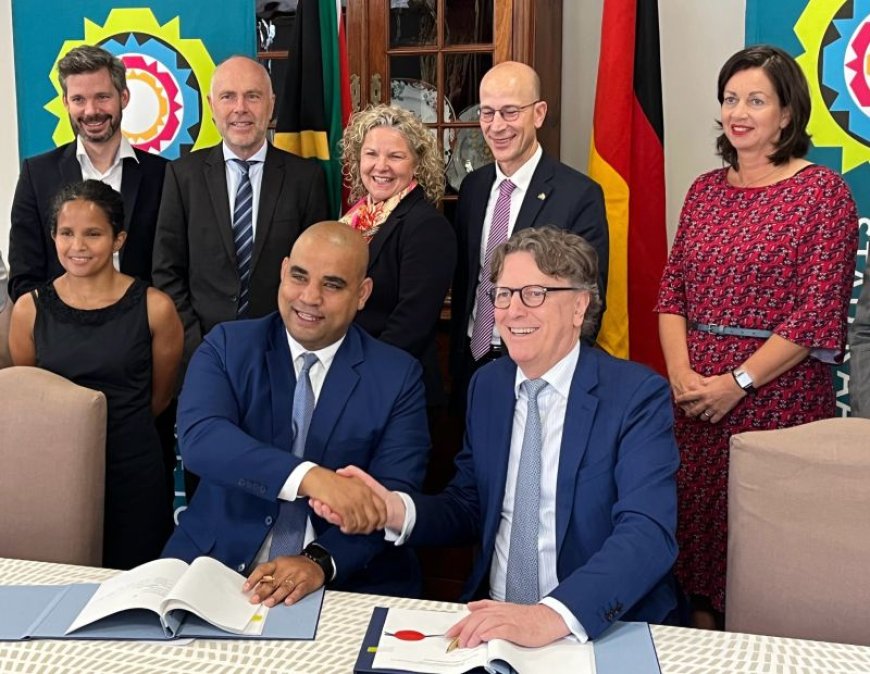South Africa and Germany Strengthen Development Cooperation with €150 Million Loan for Cape Town’s Green Energy Transition
Germany’s KfW and Cape Town sign a €150 million concessional loan agreement to enhance sustainable energy infrastructure, grid stability, and renewable energy integration under the Just Energy Transition Partnership (JETP).

In a significant step toward advancing sustainable energy solutions, South Africa and Germany have reinforced their development cooperation with a €150 million concessional loan agreement to support the City of Cape Town’s green energy transition. The agreement, signed by Stefan B. Wintels, CEO of KfW Development Bank, and Eddie Andrews, Deputy Mayor of Cape Town, marks a pivotal moment in the ongoing collaboration between the two nations under the Just Energy Transition Partnership (JETP).
The signing ceremony, held in the context of the Finance in Common initiative, was attended by key stakeholders, including Andreas Peschke, German Ambassador to South Africa, and Tanja Werheit, German Consul General. The event highlighted the importance of the longstanding partnership between Germany and South Africa, as well as their shared commitment to addressing energy challenges, fostering social cohesion, and creating jobs.
A Boost for Cape Town’s Energy Infrastructure
The €150 million concessional loan, provided through German Financial Cooperation and backed by the Federal Ministry for Economic Cooperation and Development (BMZ), will be used to finance critical infrastructure projects aimed at:
- Improving electricity distribution across Cape Town.
- Integrating renewable energy sources into the city’s energy mix.
- Enhancing grid stability to ensure a reliable and sustainable electricity supply.
These initiatives are essential for Cape Town’s transition to a low-carbon economy and align with the broader goals of the Just Energy Transition Partnership (JETP), which seeks to balance environmental sustainability with economic and social equity.
A Shared Commitment to Sustainability and Social Progress
The partnership between South Africa and Germany goes beyond infrastructure development. It reflects a shared vision for a sustainable future that prioritizes:
- Social cohesion: Ensuring that the benefits of the energy transition are equitably distributed across communities.
- Job creation: Supporting the growth of green industries and creating employment opportunities in the renewable energy sector.
- Climate action: Reducing carbon emissions and promoting the use of clean energy sources.
During the signing ceremony, Stefan B. Wintels emphasized the importance of this collaboration:
“This agreement underscores our commitment to supporting Cape Town’s transition to a sustainable energy future. By investing in critical infrastructure, we are not only addressing energy challenges but also creating opportunities for social and economic development.”
Eddie Andrews, Deputy Mayor of Cape Town, echoed this sentiment:
“This loan is a game-changer for Cape Town. It will enable us to build a more resilient and sustainable energy system that benefits all our residents while contributing to global climate goals.”
A Longstanding Partnership
The agreement builds on decades of cooperation between Germany and South Africa, particularly in the areas of sustainable development and renewable energy. Andreas Peschke, German Ambassador to South Africa, highlighted the trust and collaboration that underpin this partnership:
“Our work with South Africa and Cape Town is a testament to the power of international cooperation. Together, we are making meaningful progress toward a greener and more equitable future.”
Tanja Werheit, German Consul General, added:
“This partnership reflects our shared values and commitment to addressing global challenges. We are proud to support Cape Town’s efforts to build a sustainable energy system.”
Looking Ahead
The €150 million concessional loan is a significant milestone in Cape Town’s journey toward a sustainable energy future. By investing in critical infrastructure and renewable energy integration, this partnership is laying the groundwork for a more resilient and inclusive energy system.
As the world grapples with the dual challenges of climate change and energy security, initiatives like this demonstrate the importance of international cooperation in driving meaningful change. With the support of Germany and the broader international community, Cape Town is poised to become a model for sustainable urban development.
Conclusion
The signing of this agreement marks a new chapter in the partnership between South Africa and Germany. By working together, they are not only addressing Cape Town’s energy challenges but also contributing to global efforts to combat climate change and promote sustainable development. This collaboration is a powerful reminder that, even in challenging times, progress is possible when we stand together.
 Kinyarwanda
Kinyarwanda
 English
English









































































